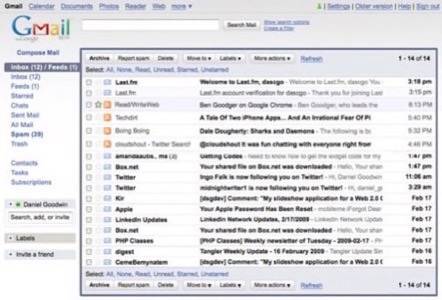Earlier this week we ran a competition to win a free ticket to Google I/O, Google’s conference for web developers being held May 27 – 28, 2009 in San Francisco. We had 10 tickets to give away and so we asked you to give us your feature requests for current Google products, or if the product has an API what third party app you would like to see. We got a great response, well over 100 comments on the post, with feature requests for popular Google products such as Google Reader, Google Health and the new Google Latitude. In this post we announce the 10 winning entries; and we find out how our readers want to see Google innovate!

There were many more than 10 good entries, so it was difficult to stop at 10. But thanks everyone who entered and sorry if yours didn’t win on this occasion.
In no particular order, here are the winning entries (some are edited slightly for the purposes of this post):
Combine Google Reader With Gmail
Daniel Goodwin says: “My suggestion is a two step process. First, it would combine two of Google’s apps that are constantly open in my browser, Reader and Gmail. They already look a lot alike and combining these would not take me off guard. So following that, I would love to see Reader (in Gmail) support viewing and posting comments, in a similar fashion to how Gmail shows an email conversation between you and others.”
Daniel did a mockup of this concept, which you can see below.

Suggested by: Daniel Goodwin
Semantic Location Data for Google Latitude
Google Latitude should include semantic location data (as opposed to addresses, coordinate, or map data, which is how latitude currently allows you to find your friends), which would allow you to know where your friends are via textual data such as “friendx is @ locationame”.
e.g.: “Jon is @ UC Berkeley” or even “Jon is @ Dwinelle Hall”
This could be integrated with the user-defined locations in gmaps; gmaps already has a vast directory of semantic location data, [so] it can be put to good use in location-based networking/services and then mashed together with other location-based services (everyblock, etc) or location-relevant services/data (yelp, movietickets.com).
Suggested by: ricefield
Google Code Deployment Process
There should be an established process to deploy from Google Code:
- to Google App Engine (exists, with web hooks, somehow)
- AND to Google Solutions Marketplace
- AND Gmail Labs, iGoogle, OpenSocial containers
- AND/OR to Android (marketplace), where applicable.
Integration is the key feature. Just look at using Gmail, Google Sites and Google Docs WYSIWYG features. Same, but then again, quite different. In other words: simple templates for building a new google/open-stack powered app, to target mashups / enterprise / browser / labs / mobile (all powered by app engine?).
Suggested by: Björn Klose
Gmail API
Google should provide an API to GMail that allow third party developers to build plug-ins like [in] GMail labs.
Suggested by: Leo
Google Calendar Access to Latitude Data
Let Google Calendar access Latitude data to help you leave on time for your appointments and to send notifications if it detects you are running late.
Google Calendar knows when and where your meetings are. Google Latitude knows where you are. Therefore, it could easily do two things:
1. Send you a message for when you should leave for an appointment, if it detects that you are not in the same place as your appointment.
2. If it detects that you are too far away from the appointment location to make it in time (e.g. your appointment is in San Jose in five minutes and you are in SOMA), then it can send you a text message asking what you want to do: a) have it e-mail the other meeting attendees on your behalf or b) send you the contact info of the person you are meeting. You can respond simply by replying to the text message. There are other scenarios Calendar+Latitude would allow, but this one would be really useful.
Suggested by: Jamie Stephens
Add Password-protected Feeds to Google Reader
Add ability to access protected feeds with Google Reader. Right now you can’t even add a Google Groups feed unless it is public (even though you are already logged in).
Phase I – allow access of non-public Google Group feeds;
Phase II – allow access to other protected RSS feeds using OpenID or other SSO method.
Suggested by: Rob Weaver
Visual Web Developer Program
Eric says: “I love Google Analytics. I build websites for Unions across the country and teach them how to update their own websites once I establish the architecture. Everyone enjoys analyzing their metrics and seeing how their site is doing. But I would really like to introduce all of my non-profit union clients to a visual web developer program by Google. I know Google has Google Sites, but what if you already have an architecture that you would like to update? How can Google help non-profits update existing websites?”
Suggested by: Eric
Embed Google Chrome (Lite) into Google Toolbar
Embed Google Chrome into Google Toolbar, which has a HUGE install base. This would be huge driver to accelerate Google’s web platform, convert more folks over to a modern browser experience. Imagine a Chrome “Lite” running inside Toolbar inside IE, billed as a “web accelerator”.
Suggested by: Charles
Crowdsourcing Platform for Non-Profits
Google could provide an infrastructure to bring crowdsourcing solutions for all (especially for use with non-profits).
Suggested by: Sidney Hargro
Google Seats
Imagine using Google to book “Seats”, e.g. in an Restaurant (maybe near to you: LBS could help), or in a theater or cinema show (an extended example below). Think about an “Expedia” for any kind of business.
Detailed Movie/Cinema example:
Do you already use Google Movie Search? It’s great! The only thing I miss is that I cannot buy my ticket online, but I have to get there and walk the line to the desk, which in a multiplex is quite annoying. And do not bother me with paper tickets: I could show a QR matrix or codebar on my device. It would be great if I could simply book/buy it online.
Note on constraints: I know that real time availability is a tricky thing, But, things like Expedia work because big operators WANT to appear in search related results, so they have an option to provide their services with some kind of API to enable the on-line booking process. Small/medium operators can evaluate mixed strategies. Many of these services could require a transaction. But I suppose that the payments (micro) business is an inevitable mark for any operator in the industry. How many years away? Two? Three? I hear that in Japan (which has quite a lucky situation, with a single dominating operator) something in this field is already being done.
Suggested by: Eugenio
Thanks again to everyone who commented on the original posts. To the winners, you will receive an email in the next 24 hours with further details about your Google I/O ticket.

















